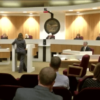Senators Sheehy, Daines Applaud Senate Passage of “One, Big, Beautiful Bill”

Montana’s U.S. Senators Tim Sheehy and Steve Daines praised the Senate’s passage of a sweeping legislative package dubbed the “One, Big, Beautiful Bill,” calling it a major victory for working families and a key step in advancing the America First agenda.
The comprehensive reconciliation bill, backed by President Donald Trump and Republican leadership, includes provisions to secure the southern border, bolster national defense, cut taxes, and expand energy production. The legislation also eliminates federal taxes on tips and overtime pay, while blocking what Republicans described as the largest tax hike in American history.
“From securing the border, to strengthening our military, to preventing the largest tax increase in history while implementing no tax on tips and overtime, the One, Big, Beautiful Bill delivers huge wins for working-class families across the country and revives the American Dream,” said Sen. Sheehy in a statement. “Montanans and Americans spoke clearly on November 5th: they expect us to deliver on the America First agenda, and they can rest assured I’ll keep fighting to unleash prosperity and restore common sense in our nation’s capital.”
Senator Daines echoed the message, tying the bill’s passage to November’s electoral results.
“The American people were clear in November that they were ready for change. Today we delivered on our promise to support President Trump’s America First agenda,” Daines said. “The Big Beautiful Bill secures the border, strengthens our national security, unleashes American energy, reduces wasteful spending and cuts taxes for working families. Montanans will be better off because of this bill and I was proud to support it.”
The legislation passed the Senate largely along party lines and now heads to the House of Representatives for final approval. Supporters have hailed the bill as a cornerstone achievement of the current Republican-controlled Congress, while critics argue it favors corporations and lacks sufficient oversight for spending cuts.










